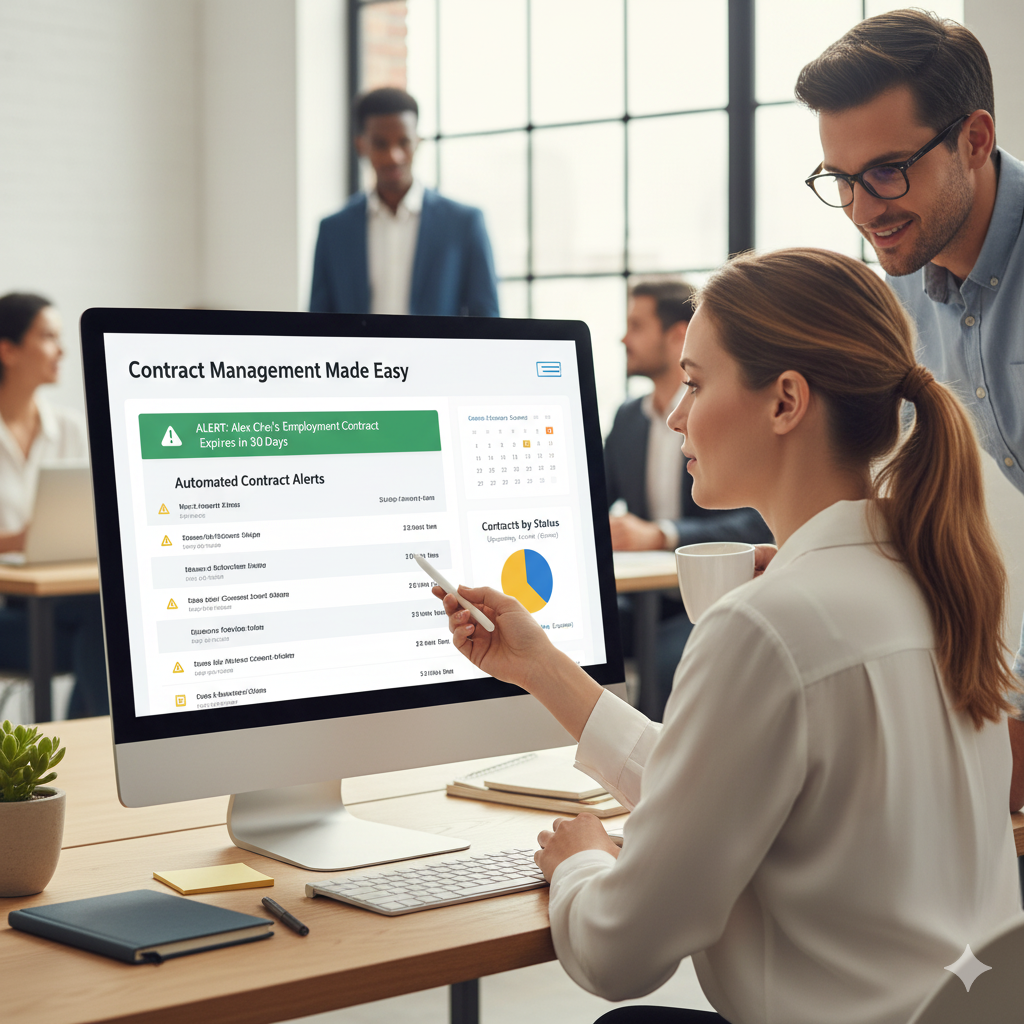In the fast-paced world of human resources, contract management is a task that requires precision and attention to detail. From employment agreements to vendor partnerships, contracts define responsibilities, timelines, and compliance obligations. However, managing dozens—or even hundreds—of contracts manually can easily lead to missed deadlines, renewal lapses, or compliance risks.
This is where a Human Resource Information System (HRIS) steps in. With automated contract alerts and centralized tracking, HRIS platforms help organizations manage contracts efficiently, reduce administrative errors, and maintain compliance—all while saving valuable time.
In this article, we’ll explore how automating contract alerts through HRIS simplifies contract management and strengthens organizational control.
The Challenge: Manual Contract Tracking
Traditional contract tracking often involves spreadsheets, email reminders, and manual follow-ups. While this approach may work for small teams, it becomes unmanageable as the organization scales.
Common pain points include:
📅 Missed contract expirations or renewals due to lack of timely alerts.
📄 Difficulty locating contracts spread across different storage locations.
⏳ Time-consuming follow-ups with multiple departments.
⚠️ Compliance risks from expired contracts or untracked amendments.
These inefficiencies can lead to financial loss, operational delays, or even legal consequences. That’s why modern HR teams are adopting HRIS-driven automation to bring structure and intelligence to contract management.
How HRIS Simplifies Contract Management
A Human Resource Information System is more than a digital filing cabinet—it’s a smart automation platform that helps HR professionals manage contracts throughout their entire lifecycle.
Here’s how HRIS enhances contract management:
- Centralized Contract Repository
HRIS consolidates all contracts—employee, project-based, vendor, or consultant—into a secure, centralized database. Authorized users can easily access, update, and review documents without switching between systems. - Automated Contract Alerts
The most powerful feature of HRIS contract management is automated alert notifications. These alerts are triggered by key dates such as:
- Contract start and end dates
- Renewal or termination deadlines
- Compliance review schedules
HRIS automatically sends email or dashboard notifications to responsible personnel, ensuring no contract goes unnoticed.
- Customizable Alert Rules
HR teams can define alert parameters based on company policy. For example:
Send reminders 30 days before expiration.
Notify both HR and department heads for review.
Escalate alerts if renewal is not confirmed within a specific period.
This level of customization ensures that contract tracking aligns perfectly with organizational workflows.
- Real-Time Dashboards
Analytic graphs within the HRIS provide visual overviews of contract statuses—such as how many are active, pending renewal, or expired. This makes it easy for HR and management to assess the company’s contractual landscape at a glance. - Digital Approvals and Audit Trails
With built-in e-signature and workflow tracking, HRIS ensures every step of the contract lifecycle—creation, approval, and renewal—is recorded and auditable, enhancing transparency and accountability.
Benefits of Automating Contract Alerts in HRIS
Implementing contract alert automation delivers measurable benefits for HR and business operations:
- ✅ No More Missed Deadlines
Real-time alerts prevent contract expirations and renewal delays. - ✅ Improved Compliance
Automated reminders ensure contracts meet legal and policy requirements. - ✅ Centralized Visibility
HRIS dashboards provide a unified view of all active and upcoming contracts. - ✅ Enhanced Efficiency
Reduces manual tracking and follow-up workload, allowing HR to focus on strategic tasks. - ✅ Better Collaboration
Alerts keep HR, operations, and legal teams aligned through shared visibility. - ✅ Increased Accountability
Audit logs track every action, ensuring full traceability of approvals and updates.
Contract Analytics: Turning Alerts into Insights
Beyond simple notifications, HRIS platforms also provide analytic graphs and reports that help HR leaders make smarter, data-driven decisions.
For instance, you can analyze:
📊 The number of contracts expiring each quarter
🕓 Average renewal cycle times
🧑💼 Contracts by department, project, or role type
⚖️ Trends in short-term vs. long-term contracts
These insights enable organizations to forecast workforce needs, optimize budget allocation, and strengthen compliance strategies.
Best Practices for Implementing HRIS Contract Alerts
To maximize the effectiveness of contract alert automation:
- Define Clear Alert Timelines
Set multiple alert stages (e.g., 60, 30, and 15 days before expiry) for better control. - Assign Accountability
Ensure each alert is linked to a specific role or department for action. - Regularly Update Contract Data
Keep contract details current to ensure alerts reflect real deadlines. - Leverage Integration
Connect HRIS with payroll, finance, or legal systems to create a unified contract management ecosystem. - Review Analytics Monthly
Use HRIS reports to identify trends, bottlenecks, or potential risks early.
Conclusion
Contract management no longer needs to be a manual, error-prone process. With HRIS automation and intelligent contract alerts, HR teams can stay ahead of deadlines, ensure compliance, and gain full visibility across all agreements.
By transforming routine administrative work into automated, data-driven processes, organizations can save time, reduce risk, and focus on what matters most — strategic workforce management.
In short, HRIS doesn’t just simplify contract tracking; it empowers HR leaders to manage contracts smarter, faster, and with total confidence.

